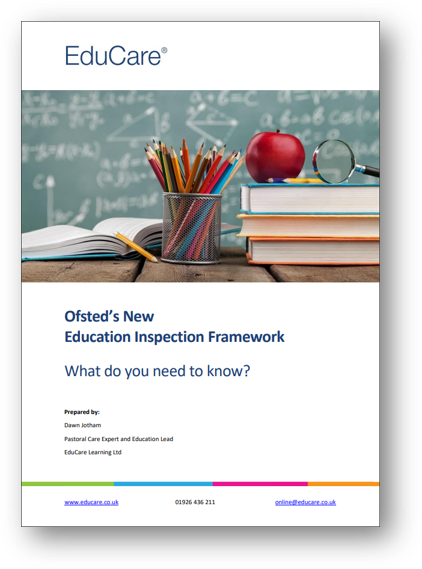Ofsted’s new focus is on welfare and wellbeing, not data and statistics.
Amanda Spielman has been quoted as saying:
"It is clear that we have reached the limits of using data alone as a proxy for educational quality. Inspection should capture the things that no data measure can, no matter how well constructed. We need to look at how a school has achieved results, not just take them at face value, and at the things that aren’t and often can’t be measured."
She has also referred to how Ofsted have previously created a “data-heavy culture” which has led to a negative impact on teacher workloads.
Under the new Education Inspection Framework, we are expecting a new era where the emphasis is on the welfare and wellbeing of teachers and pupils, and no longer focused on data and statistics.
Some of the key messages from Ofsted are that schools do not have to provide any additional evidence at all.
In his personal blog, one headteacher who has been through a pilot inspection commented:
He continued:
“Data was not used (internal or published) during the Day 1 planning meeting and was hardly touched on during the rest of the pilot.
“Internal data was not asked for at any point. The only question regarding internal tracking was made in relation to teacher workload during a teacher group interview.”
Staff wellbeing
In the new inspections, staff and leaders will be interviewed by inspectors. Schools should be prepared for how this new focus on wellbeing will be part of the new inspection framework.
To help ensure you meet the new EIF, below are five key questions that senior leaders should ask themselves. This will help determine their strengths and areas for improvement:
1) Are there robust policies and procedures in place that protect staff and pupils from bullying and harassment?
Providing clear guidelines for staff to follow is an effective way of communicating your school’s values and code of conduct. Formal policies and procedures also provide a tangible way of demonstrating the steps your school has taken to support teacher wellbeing.
2) Does your school have an in-depth induction process?
Implementing an in-depth induction process is complementary to developing robust policies and procedures as it is during this initial stage of onboarding that an understanding of the school’s norms and, importantly, reporting safeguarding process is achieved. Again, providing a record of which staff have completed this induction process is valuable evidence for Ofsted.
3) Does your school provide teachers with a mentoring programme?
Developing a mentoring programme is a great way to encourage knowledge sharing amongst staff. It is also a way of formalising a support network for teachers and staff, providing additional avenues for them to seek guidance for any challenges they face.
4) Do staff feel listened to and involved in shaping initiatives from the senior leadership team?
A key judgement from Ofsted assesses the ways in which leaders engage with their staff. Establishing clear lines of communication between leaders and staff to foster mutual respect but also allow for greater engagement. Inviting staff to play a key role in shaping initiatives will also strengthen relationships within the broader school community.
5) Do teachers feel safe?
Following reports of teacher harassment and bullying, Ofsted will assess schools on whether leaders have fostered a positive and respectful culture. This is with particular reference to spikes in bullying, peer-on-peer abuse and discrimination. Again, referring to robust policies and procedures will help teachers feel safe and provide them with clear reporting instructions.
What can you do next?
Take the first step in understanding these changes and becoming compliant by downloading our report on Ofsted’s new Education Inspection Framework by filling out our form. Our advisors are also on hand to answer any questions you may have and support with safeguarding training.
Need more information?
Email us
You can also call us on 01926680748.
FREE RESOURCE
Ofsted's New Education Inspection Framework
What do you need to know?
Our free resource includes a breakdown of the key points, including a useful 6-point check to assess if you are following the latest confirmed inspection framework.

Enter your email address below and we will email you a copy of the full report, prepared by Dawn Jotham - EduCare's Pastoral Care Expert & Education Lead.
